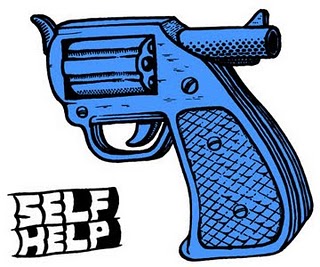
 Does self help actually help? Apparently not as much as the self-help industry would like to think. Recent research published in Psychological Science shows that repeating positive statements about oneself, which is a common self-help strategy, doesn’t always increase self esteem.
Does self help actually help? Apparently not as much as the self-help industry would like to think. Recent research published in Psychological Science shows that repeating positive statements about oneself, which is a common self-help strategy, doesn’t always increase self esteem.
Researchers asked people to repeat positive statements about themselves, such as “I am a lovable person”. They found that people who had low self esteem to begin with actually felt worse about themselves afterwards. (People with high self esteem felt just marginally better after repeating these statements.) In a second study, one group of people was asked to think only about a positive self statement, while another group was asked to think about the positive self statement as well as times when the statement was true and untrue (e.g., the statement might be “I am lovable”, and they were asked to think about times when they felt lovable _and_ times when they were not lovable). Interestingly, when people who had low self esteem thought about times when the statement was true _and_ times when statement was not true, they actually had better mood, slightly higher self-esteem, and were happier than people who only thought of the positive statement.
The authors of the study wrote: “positive self-statements have more impact on people with low self-esteem than on people with high self-esteem, and that the impact on people with low self-esteem is negative […] positive self-statements are especially likely to backfire for the very people they are meant to benefit: people with low self-esteem.”
What struck me about this study was how much positive self statements and their relationship to the person resemble the Law. It’s not a perfect parallel, and the study was not written (nor is it intended to be read) as an illustration of the Law. But just as positive self-statements (which are supposed to increase self esteem) backfire with people who need it the most, the Law (which is supposed increase obedience) also backfire on people who need to, but are not obeying the Law.
(Article citation: Wood, J. V., Perunovic, W. Q. E., & Lee, J. W. (2009). Positive self-statements: Power for some, peril for others. Psychological Science, 20, 860-866.)

COMMENTS
9 responses to “Self help…doesn’t help”
Leave a Reply













Bonnie, this is great!
Bonnie, wow. This is awesome and very helpful! I'm going to get that article.
hey justin, if you can't get it, let me know – i have a pdf of it.
Time recently published a story about positive thinking; the author reached a similar conclusion:
http://www.time.com/time/health/article/0,8599,1929155,00.html
I wonder if there is a difference when the positive statement comes from someone else? Rather than trying to convince oneself of how lovable we are, I have a hunch that it is much more 'effective' when someone else treats us as lovable. This, I am learning, is one of the joys of parenting.
However, I think it is also true that we will respond [to the affirming statement/treatment] to the degree that we value the person who gave the complement. This could easily lead to codependency (is that term still in use?) though, which suggests that the affirmation must ultimately come from the God who knows us as we are if it is to have any meaning.
I think the research might also suggest that one needs both law and gospel…the truth about the self and the forgiveness of what is true. Too often, I hear the gospel described as a blanket-statement which has little to do with the law…that, to me, is quite similar to the group that only repeated positive statements about themselves…the justus without the peccator, if you will. 😉
I don't know much about the history of positive thinking, but I have a feeling that it has its roots in mid-20th century American industrialism.
Don't quote me on this, but I think the self-help concept officially surfaced in America in the late 19th/early 20th century, through Samuel Smiles. He modified Ben Franklin's "God helps those who help themselves" into "Heaven helps those who help themselves", which (I think) was the first line in his book which was actually called Self-Help.
I agree with you, Dylan, that effective change of a person comes not from blanketing a positive statement over the self (and hoping/praying/wishing it was true), but true acceptance of the self as it actually is. Like you said, both iustus and peccator. Like the group in this study who thought about the times when the positive self-statement was true _and_ untrue – they had to deal with both the iustus and the peccator, and that actually led to more positive outcomes than people who only thought about the positive self-statement.
About the point you raise about whether the source of the positive statement might lead to a different out come, I have two thoughts. First, if it came from someone else, then it wouldn't be self-help. Second, though theories about the self differ, almost all of them have a social component–that is, there is a mirroring, or at least a dialogue, between one's understanding of the self and one's understanding of other people's understanding about the self. In other words (and put very simply), who I am depends on a) who I think I am, b) who you think I am, and c) who I think you think I am. Obviously b and c are related (especially if you take the view that objectivity is subjective). All that to say, there is a very deep part in a person that responds to other people because the self is inherently social.
You should all read Dr. Jean Twenge's book, "Generation Me," for a devastating critique of the negative impact self-esteem philosophies have had on our current youth. Mike Horton recently interviewed her on The White Horse Inn.
Thank you Bonnie, esp. for para. 3. 😉
Ok, I have a confession to make…
I love some of the selp help stuff and am a big fan.
A quick couple of points.
Not all self help is centrally concerned about your self image. Much of it centers on acquiring a needed skill or habit. For those of us who failed to learn some important basics in our childhood these resources can be life savers.
My parents made no effort whatsoever to teach me the basics of money, so a blogs like http://www.thesimpledollar.com and
http://www.freemoneyfinance.com have really been of value in improving my life and helping me be a better provider for my family.
The book 'Getting Things Done' by David Allen and the blogs http://www.zenhabits.net have helped me to not be such a disorganized clod. I love all their simple tips and shortcuts to getting organized and doing a better job in all my vocations.
You should all read Dr. Jean Twenge’s book, “Generation Me,” for a devastating critique of the negative impact self-esteem philosophies have had on our current youth. Mike Horton recently interviewed her on The White Horse Inn.